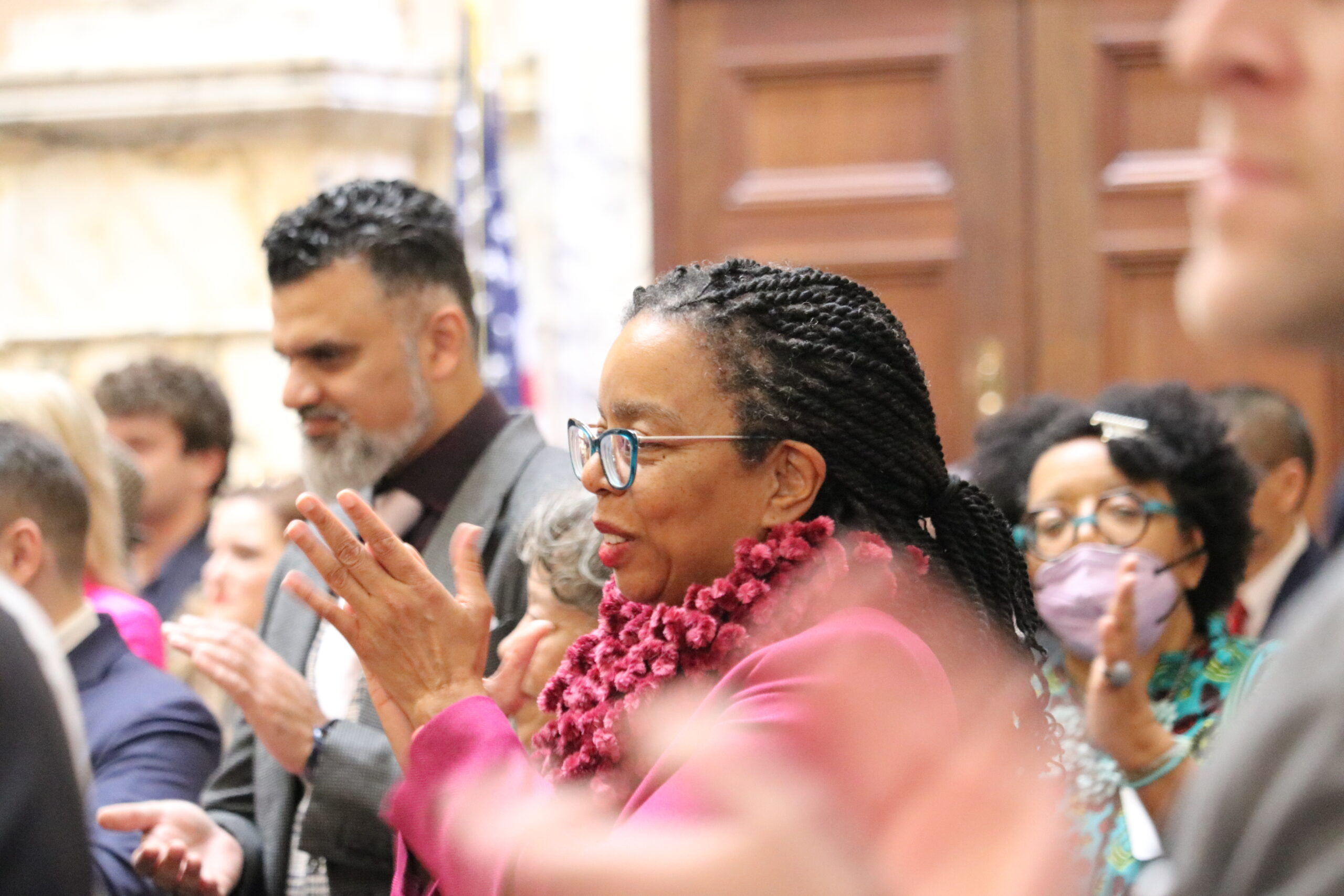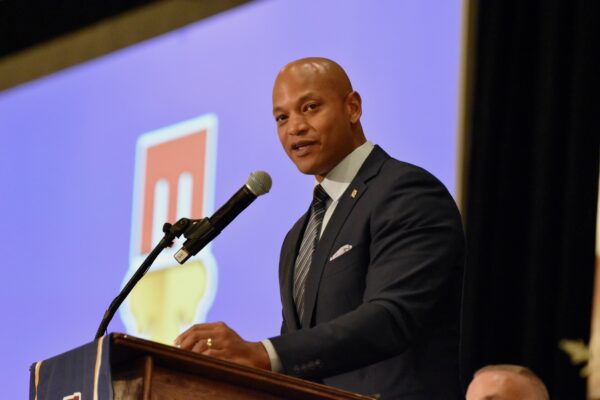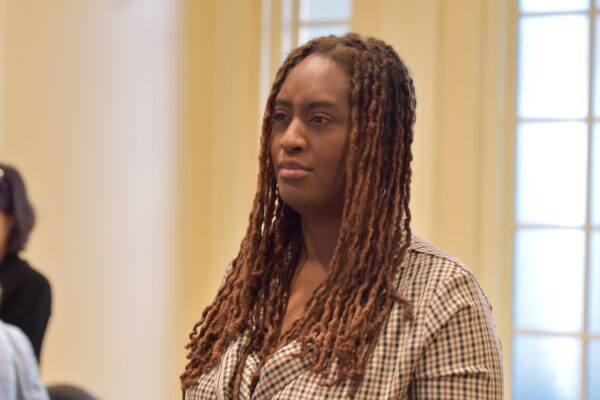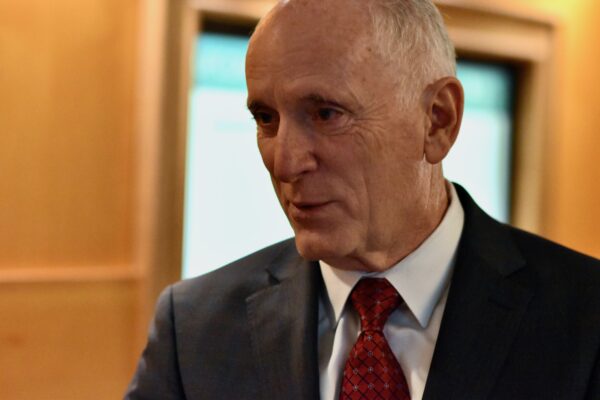City lawmakers hope to avert transportation cuts; one proposes ‘itty bit of a fee or tax’

A state delegate from Baltimore is proposing an increase in the state sales tax that could be dedicated to paying for transit.
Del. Robbyn Lewis (D-Baltimore) floated the increase during a meeting Tuesday with Baltimore-based Transit Choices.
Lewis, the only “car-free” lawmaker in the General Assembly, said she has had discussions with at least one other lawmaker about “whether we could raise revenue for transit through a statewide ballot initiative. Ask the people of Maryland, whether they would be open to paying a little itty bit of a fee or tax, a half a cent on every purchase like a sales tax bump, if those funds were funneled directly into our transit needs.”
She said an annual survey by a national transportation advocacy group found support this year for transit ballot initiatives nationally.
“They pass. People were willing to tax themselves to pay for transit,” Lewis said.
Lewis did not provide specifics for such a tax or fee increase. A ballot initiative would likely be difficult as Maryland, unlike California and other states, is more limited as to how issues can be put directly to voters. Any proposed increase would require legislative action.
Such a proposal may also be seen as jumping over the ongoing work of the Transportation Revenue and Infrastructure Needs Commission. The 31-member panel is tasked with modernizing how the state prioritizes and pays for road and transit projects. The panel is scheduled to meet Wednesday to finalize interim recommendations that could include a fee for owners of electric vehicles as well as toll increases on out-of-state drivers.
The panel will work through 2024 toward recommendations that will bolster a Transportation Trust Fund heavily dependent on declining tax collections on motor fuel and new vehicle purchases.
The idea is another in a growing list offered by county leaders and legislators anxious to avert a potentially devastating cut to transportation.
State Transportation Secretary Paul Wiedefeld announced budget and service cuts would be necessary to eliminate a $3.3 billion transportation budget shortfall.
Democratic Gov. Wes Moore’s transportation secretary said that 8% will be trimmed from the budgets of each agency within the transportation department.
Roughly $1 billion will be cut from from transportation’s operating budget and another $2 billion from its capital budget. Local governments will see a $400 million reduction.
Lewis expressed optimism that the cuts could be averted.
“The legislature will review, deliberate, debate, fight,” said Lewis. “I’m sure there will be tears, but at the end of the day, the governor proposes the legislature disposes. That budget proposal will take its place, along with all the other bills we’ll be considering during session.”

Gov. Wes Moore (D) speaks to county leaders at the 2023 Maryland Association of Counties winter conference in Cambridge. File Photo by Bryan P. Sears.
In a speech to county leaders last week, Moore defended the reductions as tough medicine.
The cuts surprised lawmakers, especially those from Baltimore.
Lewis said she and others are still “reeling from the news, the double whammy of proposed budget cuts and service cuts.”
In recent days, Lewis and roughly 70 lawmakers who are members of the Transit Caucus met with state transportation officials to discuss the cuts.
Lewis said that Wiedefeld and Maryland Transit Administration Administrator Holly Arnold “made it very clear that they understand the implications in terms of inequities.”
“The impacts will be felt disproportionately by communities that are already underserved with transit,” she said. “They understand the potential impacts to our planned requests for federal funding. They know how it makes us look to the feds. It doesn’t make us look good. They also understand that nobody wants to have to do this or that $3 billion in cuts are wanted by anyone, least of all our governor who came in with a promise to invest.”
Baltimore will disproportionately feel the pain.

Del. Stephanie Smith (D-Baltimore City), co-chair of the legislative Program Approval Process Work Group. Photo by Bryan P. Sears.
On Tuesday, Del. Stephanie Smith (D-Baltimore) said the cuts to the city are “untenable.”
“The current proposed budget falls far short of what is equitable,” said Smith, who chairs the city’s delegation in the House. “It’s not a nuanced budget cut. It’s just across the board. And the impact is going to be most acute among people who rely upon public transit in Baltimore, to get to school, to get to work, to get to even the hospital. And so quite frankly, I will be in continued discussions with this administration about how to both make the reductions that might be needed but make them in an equitable and nuanced way that doesn’t disadvantage those who actually need public transit.”
Moore has been a vocal cheerleader for Baltimore. In October, he declared that “this is a new day” for the city.
“For this to be Maryland’s decade, it has to be Baltimore’s time,” Moore said during a cabinet meeting stop in the city.
As part of the billions in cuts that Moore and transit officials announced, Baltimore would lose nearly $33 million in Highway User Revenues, a decrease of about 14%.
The state’s 23 counties and nearly 160 small, incorporated subdivisions combined will see a cut totaling more than $19.7 million.
The cuts announced last week upend a five-year effort to restore, in part, what had been cut more than a decade ago.
For roughly four decades, the state’s 24 major political subdivisions shared a portion of the Transportation Trust Fund to maintain roads and bridges.
But that changed during the Great Recession when the state ended its 70-30 split.
For the decade that followed, the Maryland Department of Transportation kept 90% of the dedicated fund.
The 23 counties and municipalities divided 2% amongst themselves. As a result, the counties saw their $300 million annual allocation in 2007 decrease to $40 million by 2018.
Baltimore maintains all the roads within its boundaries, and its allocation dropped by $100 million.
Other municipalities saw their shares cut by as much as 96%, with total annual funding falling from $45 million in fiscal 2008 to $1.6 million in fiscal 2011.
Baltimore will also see a 3% reduction in funding earmarked for the Charm City Circulator.
Smith was asked to reconcile reductions with the governor’s support of the city.
“You can’t reconcile it,” she said. “I think that, again, this is where nuance comes in. An 8% cut across the board is a nuance-free cut. It’s just a sweeping cut.”
And the cuts will have a deeper impact on the safety of the system, she said.
“When you get to that next layer of analysis, and you see a 30% reduction in state-of-good-repair [status], that’s something that’s going to really cripple and hurt riders in Baltimore who are relying on these being safe,” Smith said. “There couldn’t be a better punctuation of the need not to have such a critical cut to the state-of-good-repair than literally a day or two later finding out that our light rail is not operational for reasons that require us to improve our maintenance.”
Last week Wiedefeld announced the suspension of Light Rail service following an October fire in one of the system’s cars.

Maryland Transportation Secretary Paul Wiedefeld. File photo by Bryan P. Sears.
Following that fire, “we found some things recently that said, wait a minute, this may occur in other cars,” he said.
In all, 53 cars, all 30 to 40 years old, are out of service for safety inspections.
“We’re going to examine every car and make sure it meets the standard,” he said last week, following Moore’s speech to county leaders.
For now, the service is suspended indefinitely.
“We will get there as quick as we can,” Wiedefeld said of the re-opening of the line. But it’s going to be based on the safety aspect of it first.”




 Creative Commons Attribution
Creative Commons Attribution